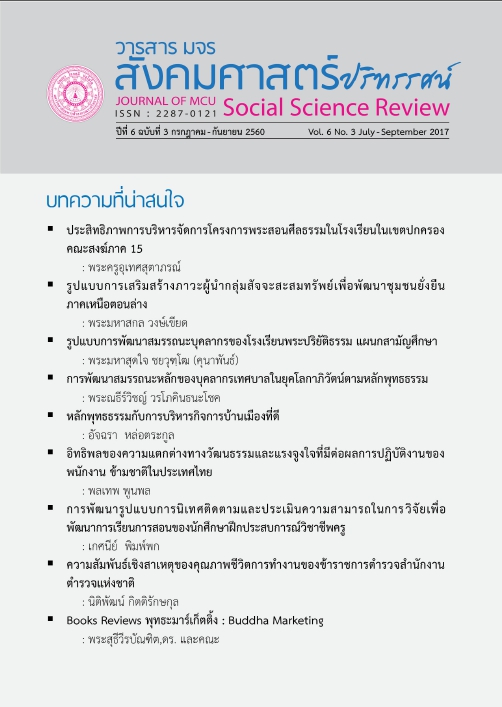อิทธิพลของความแตกต่างทางวัฒนธรรมและแรงจูงใจที่มีต่อผลการปฏิบัติงานของพนักงาน ข้ามชาติในประเทศไทย
คำสำคัญ:
ความแตกต่างทางวัฒนธรรม พนักงานข้ามชาติ แรงจูงใจ ผลการปฏิบัติงานบทคัดย่อ
วัตถุประสงค์ของการวิจัยครั้งนี้ เพื่อตรวจสอบอิทธิพลของความแตกต่างทางวัฒนธรรมที่มีผลต่อการปฏิบัติงานของพนักงานข้ามชาติในประเทศไทย และศึกษาบทบาทการส่งอิทธิพลผ่านแรงจูงใจที่มีต่อผลการปฏิบัติงานของพนักงานข้ามชาติในประเทศไทย โดยใช้ระเบียบวิธีวิจัยเชิงปริมาณ เก็บรวบรวมข้อมูลโดยการสำรวจด้วยการใช้แบบสอบถาม ซึ่งกลุ่มตัวอย่างในการวิจัยคือ พนักงานชาวต่างชาติที่ทำงานในเขตกรุงเทพมหานคร จำนวน 359 คน ผลการวิจัยพบว่าความแตกต่างทางวัฒนธรรมมีอิทธิพลทั้งทางตรงและทางอ้อมต่อผลการปฏิบัติงานของพนักงานข้ามชาติ โดยความแตกต่างทางวัฒนธรรมเป็นปัจจัยหลักที่มีอิทธิพลทางลบต่อผลการปฏิบัติงานของพนักงานข้ามชาติ สำหรับอิทธิพลทางอ้อม พบว่าแรงจูงใจเป็นตัวแปรส่งผ่านระหว่างความแตกต่างทางวัฒนธรรมและผลการปฏิบัติงาน ดังนั้น แรงจูงใจจึงเป็นปัจจัยส่งเสริมที่สำคัญต่อผลการปฏิบัติงานของพนักงานข้ามชาติให้มีประสิทธิภาพ
เอกสารอ้างอิง
Anuwat Krasang. (2014). Leader in the globalization. Journal of MCU Social Science Review, 3(2), 26-38.
B. Clegg and S.J., Gray. Australian expatriates in Thailand: some insights for expatriate management policies. International Journal of Human Resource Management, 13(4), 589-623.
C., Yao. (2013). The perceived value of Chinese expatriates’ career capital: A symbolic capital perspective. Journal of Global Mobility: The Home of Expatriate Management Research, 1(2), 187–218.
D., Matsumoto. (2000). Culture and Psychology: people around the world, 2nd edition. Canada: Nelson Thomson Learning.
F.E., Jandt. (2004). Intercultural Communication. United States of America: Sage Publication, Lnc.
F.W., Swierczek and J. Onishi. (2003). Culture and Conflict: Japanese Managers and Thai Subordinates (Personnel Review). 32 No. 2: 187-209.
G., Hofstede. (1984). Culture’s consequences: International difference in work- related values. CA: Sage.
GMAC. (2004). Global Relocation Trends 2003/2004 Survey Report, GMAC Global Relocation Services. Oak Brook, IL: National Foreign Trade Council and SHRM Global Forum.
H., Sinangiland, D., Ones. (2003). Gender difference in Expatriate Job Performance. Applied Psychology: An International Review, 52(3),461-475.
J., Lauring, J., Selme and J.S., JACOBSEN. (2014). Business or Pleasure? Blurring Relocation Categories and Motivation Patterns among Expatriates. Scandinavian Journal of Hospitality and Tourism, 14(2),170–186.
P., Poonpol. (2010). Determinants of expatriate cross-cultural adjustment and its effect on performance. AU Journal of Management, 8(2), 52-64.
P.M., Caligiuri. Assessing expatriate success: Beyond just “being there. In Saunders D.M., Aycan Z (Eds.). (1997). New approaches to employee management. Greenwich, CT: JAI Press.
R., Ho. (2006). Handbook of univariate and multivariate data analysis and interpretation with SPSS. NW: Taylor & Francis Group.
R., Konopaske and S., Werner. (2005). US managers’ willingness to accept a global assignment: do expatriate benefits and assignment length make a difference? International Journal of Human Resource Management, 16, 1159-75.
V., Suutari, C., Brewster, K., Riusala, and S., Syrja¨kari. (2013). Managing non-standard International experience: Evidence from a Finnish company. Journal of Global Mobility. Vol,. 1(2), 118–138.
ดาวน์โหลด
เผยแพร่แล้ว
รูปแบบการอ้างอิง
ฉบับ
ประเภทบทความ
สัญญาอนุญาต
ลิขสิทธิ์ (c) 2018 วารสาร มจร สังคมศาสตร์ปริทรรศน์

อนุญาตภายใต้เงื่อนไข Creative Commons Attribution-NonCommercial-NoDerivatives 4.0 International License.
เพื่อให้เป็นไปตามกฎหมายลิขสิทธิ์ ผู้นิพนธ์ทุกท่านต้องลงลายมือชื่อในแบบฟอร์มใบมอบลิขสิทธิ์บทความให้แก่วารสารฯ พร้อมกับบทความต้นฉบับที่ได้แก้ไขครั้งสุดท้าย นอกจากนี้ ผู้นิพนธ์ทุกท่านต้องยืนยันว่าบทความต้นฉบับที่ส่งมาตีพิมพ์นั้น ได้ส่งมาตีพิมพ์เฉพาะในวารสาร มจร สังคมศาสตร์ปริทรรศน์ เพียงแห่งเดียวเท่านั้น หากมีการใช้ภาพหรือตารางหรือเนื้อหาอื่นๆ ของผู้นิพนธ์อื่นที่ปรากฏในสิ่งตีพิมพ์อื่นมาแล้ว ผู้นิพนธ์ต้องขออนุญาตเจ้าของลิขสิทธิ์ก่อน พร้อมทั้งแสดงหนังสือที่ได้รับการยินยอมต่อบรรณาธิการ ก่อนที่บทความจะได้รับการตีพิมพ์ หากไม่เป็นไปตามข้อกำหนดเบื้องต้น ทางวารสารจะถอดบทความของท่านออกโดยไม่มีข้อยกเว้นใดๆ ทั้งสิ้น





